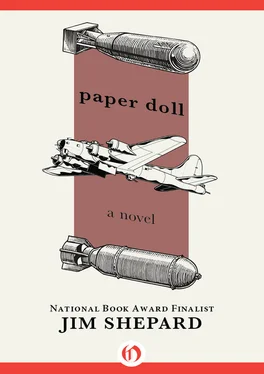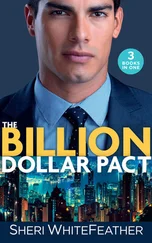“I wish I could go instead of you guys,” Stormy said.
“I’m with you,” Snowberry said. Ball gave Stormy the last watch and he slipped it into an open spot on his arm, and ran his forefinger from wrist to elbow over watchbands.
“Boy, if we go down, Stormy’s rich,” Ball murmured, eyeing the arm over his shoulder.
“What’re you, kidding?” Hirsch said. “Some of those watches, I think they came out of cereal boxes.”
They picked up their exterior flight clothing, parachutes, and oxygen masks. They went to the armament shops to be issued their fifty-caliber guns. They looked their individual guns over with agitation, some breaking them down right there and reassembling them. Any jams or sticking, anything less than smooth operation, was cause for bitter arguments with the armorers. Bryant checked his on the canvas engine tarps the line crews had left on the grass beside the hardstand, remembering Favale and the Texas sun at Harlingen. There were fights of near-riot intensity over ammunition: everyone wanted as much as possible, to hell with conservation, and some crews were stealing from the next plane over if the other crew was late arriving. There were extra supplies coming by truck, they were assured, and it was up to the individual captains to decide how much extra weight to take on. Gabriel decided by one-man committee on ten thousand rounds per station, which they loaded in huge wooden boxes all over the plane, like haphazard cargo. Bryant had expected Lewis to argue passionately for limitless ammo, but he had not.
There was no point, he explained, when Bryant asked about it. They were watching the crew of the plane next to them skirmish with another crew further down the flight line over a box of ammo left under the tail. Someone was brandishing a piece of cable like a whip and it snapped and cracked authentically. The plane they were fighting beneath, it occurred to Bryant, was startling and incontrovertible proof of a maximum effort: a real lemon that had aborted every mission flown so far, and had never dropped bombs on its target. It had been renamed No Way. They had assumed before it had appeared next to them looking shaky and ready to go that it was to be cannibalized for spare parts.
“We got the 2,780 blues,” Lewis said. He had apparently not finished with the topic of extra ammo; 2,780 was the number of gallons of fuel the B-17 held. “We got the fuel. We got the bombs. We got all this ammunition, we got the ten of us. Takeoff in that situation is a real interesting proposition. It’s like I strap twenty-seven gallons of fuel to your ass, fill your pockets with lead sinkers, and ask you to jump that fence.”
They watched Ball and Piacenti heft a box into the waist.
“No, I’m not gonna argue for more weight,” Lewis said. There was a crash from within and Piacenti said, “Lift it! Lift it, for Chrissakes!”
“Imagine all the bullets that are going to Schweinfurt?” Bryant said.
“I know.” Lewis headed for the hatch near the tail. “We may not hit any fighters, but we sure might knock a few cows silly.”
According to Hirsch it was coming up on 5:15 a.m. Bryant climbed aboard and went through the flight engineer’s panel with Tuliese, and then ran through his checks with Gabriel and Cooper. Finally there was nothing more to check, and Tuliese turned the plane reluctantly over to them and climbed out. Bryant could see him gazing back at Paper Doll like someone who’d left family heirlooms in the hands of vandals.
Ball and Lewis were up beside him, for no reason, it seemed, before going back to their stations. Ball hesitated at the catwalk over the bomb bay, waved, and held a thumbs-up signal. “I guess it’s like it’s in the hands of God, now,” he called.
“God didn’t pick Schweinfurt,” Lewis said. Ball stopped halfway across the catwalk and knitted his brows to indicate he hadn’t heard, and then his face brightened and he pretended he had, and he nodded.
“Idiot,” Lewis muttered. He shook Bryant’s hand. He crossed the catwalk to the radio room and shook Bean’s hand. Bean removed his headphones for the occasion but Lewis didn’t say anything, and disappeared through the door to the waist.
Bryant climbed into his turret sling for a quick test and raised his head into the Plexiglas. The black guns and the glass encased him like a pickle in a jar. He connected his interphone. Cooper was already checking the stations over it, and he gazed ahead at all the dark bustle. The clouds were surprisingly thick and low; it was like being in a vast room. He noticed without enjoyment the beauty of the lights of the trucks and the tower spindling out and intersecting, and the arrayed red and green lights of a runway full of B-17’s.
Willis Eddy seemed to be filing or sawing something up in the nose, the sound coming rhythmically over the interphone as a background to his voice. “Anything’s better than a month of going after U-boat pens,” he said. “The way I figure it. Solid concrete.”
“What are you doing?” Gabriel asked him. “What’s that noise?”
The noise stopped.
“0530,” Hirsch announced.
The ceiling had lowered still more. North of the tower the clouds were dropping and were now so low that the term “ceiling” seemed a little foolish.
“This is fog, ” Eddy called from the bombardier’s perch. “What’re they talking about, no fog?”
“Stormy,” Bryant lamented. “What happened?”
“It’s always the weather nobody figures on,” Gabriel said. The lights all around them were reflecting in carnival-like patterns on the cloud wall above. The grayness drifted in to the point of easing No Way into a shadowy uncertainty beside them.
“We can get up in this,” Cooper said. “But I hate to think about assembly.”
“We try to assemble in this,” Lewis said from back in the tail, “we’re gonna have a few unplanned mergers.”
“It just came over,” Gabriel said. “We wait.”
They piled out and sat or lay around the hardstand on excess equipment. Bryant sat on a coil of rope. Snowberry sat on a squat twelve-gallon drum of hydraulic fluid. Ball settled in Indian style against an empty fifty-caliber box and was eating his candy. Piacenti wagged a finger and warned him he’d wish he had it later.
Audie appeared out of the fog, nosing her way over. Bryant said, “Hey, Audie, where you been?” and the dog’s tail wagged and she padded gingerly over to him. She lay down to wait with them, her muzzle tucked between her front paws. Bryant gave her one of his Baby Ruths. She chewed exaggeratedly, the caramel sticking to her molars.
Bean was down on his hands and knees as though he had lost something or was studying the surface of the hardstand. He threw up, bracing himself with his hands spread wide, and shuddering, and then made an effort to clean it up.
“National League,” Snowberry said. His hands were together between his knees and he was looking out toward Bryant. “Goobers Bratcher. Chops Broskie. Played for the Cards and Braves. Skeeter Scalzi. The Giants. Bunions Zeider. Spinach Melillo, Inky Strange. Podgie Weihe. Yam Yaryan.”
Bean rose and worked his way unsteadily down to the nose. He sat by himself.
“I think Bean asked that girl to marry him,” Piacenti theorized.
Lewis was flicking small stones into the mess Bean had made. “That’s one way to solve your problems. How do you know that?” They all gazed at Bean, a small Buddha out in the fog under the nose, crosslegged in his heavy jacket.
“He showed me. He gave her a ring I think he got at Woolworth’s. Probably turn her whole arm green.”
“Jeez,” Ball said, wrapping the end of his Oh Henry! and repocketing it. “Married. Jeez.”
Читать дальше












